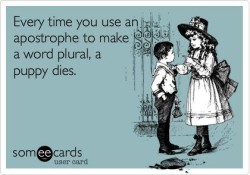 Whenever anyone writes a post or article titled “The Five Biggest Grammar Mistakes” or “Three Grammar Mistakes That Will Make You Look Stupid,” apostrophe issues are always included. What makes this little “high comma” so confusing? Let’s take a look at the mighty apostrophe .
Whenever anyone writes a post or article titled “The Five Biggest Grammar Mistakes” or “Three Grammar Mistakes That Will Make You Look Stupid,” apostrophe issues are always included. What makes this little “high comma” so confusing? Let’s take a look at the mighty apostrophe .
There are two main uses for this little mark: (‘)
- Apostrophes are used in contractions to replace the missing letters. (Contractions are words or word combinations in which letters have been omitted: can’t for cannot, we’re for we are, etc.
- Apostrophes are used to make nouns possessive: Mary’s hat; my brother’s car, etc.
- Apostrophes are OCCASIONALLY used in plurals. Let me repeat: OCCASIONALLY.
Of course the most common apostrophe errors are the its versus it’s and the your versus you’re versus yours. Number 1 above says that apostrophes are used in contractions. It’s is a contraction meaning it is. You’re is a contraction meaning you are. Easy. When it’s and you’re are used as contractions, you use an apostrophe.
Notice that Number 2 above says possessive nouns, not possessive pronouns. Possessive pronouns do not have apostrophes! These pronouns include ours, theirs, his, hers, yours, whose, and its. So, none of the possessive pronouns includes an apostrophe including its, when it is used as a possessive.
It’s means it is: it’s raining. Its is possessive: The cat ate its food.
You’re means you are: You’re coming with us. Your is possessive: I made your lunch. This lunch is yours. Who’s means who is: Who’s this person? Whose is possessive: Whose coat is this?
Remember: Contractions always have apostrophes to stand in for the missing letter or letters. Possessive pronouns do not have apostrophes.
Other things to remember about apostrophes:
- Apostrophes are used in possessive nouns. Possessive implies ownership and is not the same as plural, which means more than one. To make a singular noun possessive, we usually add an apostrophe and an s. For example: the dog’s food. my mom’s shoes.
- For plural nouns that don’t end in s, also use an apostrophe and an s for the possessive. For example: the children’s rooms, those women’s hats.
- For plural nouns that end in s, just put an apostrophe after the s. For example: the dogs’ food (more than one dog), my sisters’ toys (more than one sister)
- For singular nouns that end in s, usually use an apostrophe and an s, going by the way you would say the word. For example: Thomas’s room, my boss’s desk, Frederick Douglass’s speech. But you would probably say Miles’ room, because you might not pronounce it as Miles’s.
- Plain old plurals generally DO NOT have an apostrophe! For example: I just posted some new photos (not photo’s). The oranges are on sale (nor orange’s).
- Use an apostrophe for plurals of letters, numbers, and abbreviations only of the word is confusing without the apostrophe. For example a‘s, so it isn’t confused with the word as. Same goes for i‘s and u‘s. ABCs does not need an apostrophe, as it is not confusing as it is. Some people like to use an apostrophe with plural numbers, but is isn’t necessary: Your answer contains too many 7s. Note that when you use a word or number or letter as itself (too many 7s, all A‘s, four i’s in this word, too many ands, etc.) the letter, number, or word is in italics, but the s is not.
- Sometimes people, especially in informal speech, will make a noun into a contraction: That photo’s really good. It means photo is, so it is a contraction and you do need an apostrophe; it is not a plural.
- When you say 1960s, there is no apostrophe.
- When you say the ’60s, there is an apostrophe because you have left out part of the year.
There are no other uses of the apostrophe that I can think of right now. Remember: contractions use apostrophes and possessives nouns use apostrophes. Possessive pronouns do not.
Comments about this post and suggestions for future posts are always welcome!
Announcements:
Come hear 18 local writers discuss their new books at the Redwood Writers book launch this Sunday from 2-5 at the Flamingo Hotel in Santa Rosa, CA. Guests are FREE! I will be launching The Best Grammar Workbook Ever!
I will be speaking — about grammar, of course — at the Mill Valley Rotary this coming Tuesday, July 14.
Have a WORDwhile week!



Thank you, thank you. Misuse of apostrophes is my biggest pet peeve. I assume it’s because my name has one that I’m especially vigilant because my name contains one!
Misusing an apostrophe to make a plural is astoundingly common!
Keep up the good work.
You are very welcome. I hope no one puts the apostrophe in the wrong place in your name!
Nice ideas